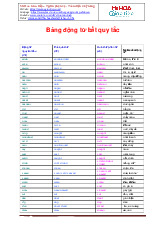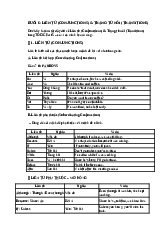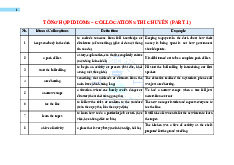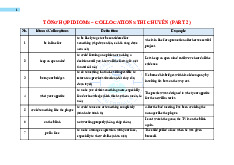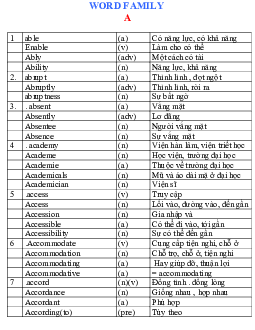



Preview text:
ANSWER KEY Notes
• More practice on phrasal nouns and adjectives can be found in Cambridge Phrasal
Verbs in Use, Oxford Word Skills: Phrasal Verbs & Idioms and practically any book that
deals with or contains lessons on phrasal verbs. Phrasal compounds are limited and easy
to teach, so it’s a good idea to collect them from phrasal verbs dictionaries and create a ‘Resource’ bank. (A) 7. naturopathy (F) 8. apathetic 9. pathway 1. contraindications 10. warpath 1. A 2. unpredictable 2. F 3. self-contradictory (D) 3. C 4. non-addictive 4. G 5. bioindicators 5. B 1. before or ahead of time 6. H (B) 2. together 7. E 3. (a)round 8. D 4. after or later 1. cide/cidal 5. throw (G) 2. vore/vorous 6. go or come 3. ship 7. name 4. hood 8. time 1. uncouth 5. tight 9. carry or bring 2. indelibly 10. writing 3. Inept (C) 4. inflammatory (E) 5. incorrigible 6. incandescent 1. antipathetic 7. innocuous 2. bypaths 1. A, inaudible 8. dismay 3. unsympathetically 2. B, autoimmunity 9. insidious 4. sociopathic/idiopathic/p 3. A, beneficiaries 10. ungainly sychopathic 4. C, predecessors 11. inflammables 5. pathfinders 12. unkempt 6. path-breaking
Notes on Origins & Usage
• Uncouth originally meant ‘unknown’. For much of its history, most people would not
have used or understood its opposite, couth. This originally meant ‘known’ but was later
only used in Scottish English, for ‘kind’ or ‘comfortable’. Uncouth, though, developed a
fully independent life. It came to refer to unsophisticated language or style in the late
17th century, and then to uncultured or ill-mannered people or behaviour. In 1896 the
English essayist and critic Max Beerbohm (1872–1956) was the first to use couth as a
deliberate opposite of uncouth meaning ‘cultured, well-mannered’.
• Ungainly developed in a similar way. There is a word gainly, but it has never been
common and its original meaning, ‘suitable, fitting’, now occurs only in Scottish
dialect. Gainly came from the old word gain, which was used especially in the senses
‘kindly’ and ‘convenient’, and is of Scandinavian origin.
• The words inflammable and flammable both have the same meaning, ‘easily set on fire’.
This might seem surprising, given that the prefix in- normally has a negative meaning
(as in indirect and insufficient), and so it might be expected that inflammable would
mean the opposite of flammable, i.e. ‘not easily set on fire’. In fact, inflammable is
formed using a different Latin prefix in-, which has the meaning ‘into’ and here has the
effect of intensifying the meaning of the word in English (also as
in incandescent). Flammable is a far commoner word than inflammable and carries less risk of confusion.
• People have only combed their hair since around 1400; before that they would
have kembed it and their hair would have been kempt. These are forms of the old
word kemb, which was eventually replaced by the related word comb, an Old English
word which may have the underlying sense of ‘tooth’. The term has survived, though,
sometimes in the form kempt but especially in unkempt, which has come to mean
‘untidy or dishevelled’ rather than ‘uncombed’. (H) 1. bespectacled 2. bioprospecting 3. disrespectful 4. introspective 5. multispectral 6. perspective 7. irrespective 8. retrospect 9. self-respecting 10. unsuspectedly Teaching Tips
• You may also want to ask your students to answer the following question:
(6+) His book is an engaging and __________ exploration of the many facets, in
Britain and abroad, of the old amateur game. (PERSPECTIVE)
• Answer: perspicacious
• In early use perspective was a name for the science of optics: it comes from medieval
Latin perspectiva (ars) ‘science of optics’, from perspicere ‘look at closely’. The notion
of perspective in drawings dates from the end of the 16th century. The same verb lies
behind perspicacious (early 17th century) which comes from the Latin for ‘seeing clearly’. (I) (J) 1. unpasteurised 1. non-avian, aves 2. panic-mongering 2. inauspiciously 3. Panic-stricken 3. disgruntlement 4. supervolcano 4. peroration 5. biodiesel 5. oracle 6. photovoltaic 6. sightseers 7. antivivisection 8. viperous 9. televisually 10. televisable 11. televisionary 12. indestructibly 13. non-destructive
14. self-destructive/auto-destructive 15. pan-destruction 16. non-proliferation
17. counterproliferation/anti-proliferation Notes on Origins
• The Latin word for ‘bird’, avis, is the root of a number of English words that relate to
birds such as aviary, aviation, etc. and their derivatives.
• An auspex was a person who observed the flight of birds for omens about what to do in
important matters. A related word, auspicium, meant ‘taking omens from birds’.
Like auspex, it came from avis ‘bird’ and specere ‘to look’, and is the source of auspice,
(in)auspicious, etc. and their derivatives.
• An auspex was also known as an augur (again, avis ‘bird’ is the root of this word,
together with garrire ‘to talk’), hence inaugural, inaugurate, etc. Teaching Tips
• Extension: words with vis, vid, view; words with see, sight (K) 1. semi-darkness 9. autopilot 2. micro-environments 10. white-knuckled 3. umbriferous 11. far-flung 4. innermost 12. tank-farming 5. even-handed 13. molten 6. long-awaited 14. matriarchal 7. scot-free 15. spring-cleaning 8. far-fetched 16. hard-earned
17. half-truths/untruths/part-truths 29. bygone 18. fast-tracked 30. throughput 19. full-fledged 31. clampdown 20. outstripping 32. downtrodden 21. biofeedback 33. backtrack 22. watered-down 34. downplaying 23. uprisings 35. meltdown 24. walk-through 36. bypassing 25. cooling-off 37. sell-by 26. longed-for 38. offshoring 27. long-drawn-out 39. outsource 28. unputdownable 40. dressing-downs Teaching Tips
• Extension: compounds with far, long, most, by; compounds ending with prepositions
(e.g. unlooked-for, uncalled-for, unheard-of); derivatives and compounds with
awareness of fixed phrases and collocations
